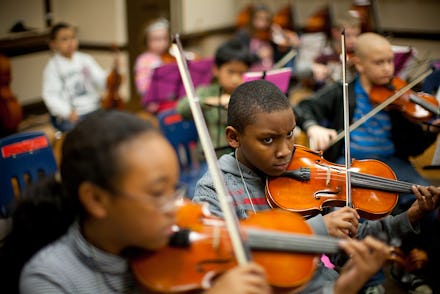Playing an Instrument as a Child Was One of the Best Choices You Made

Just recently, researches scored the ultimate point for those who believe that music and arts education are invaluable for our society: A study conducted at Northwestern University not only links music programs with positive brain development, it shows that pretty much anyone can benefit massively from music instruction.
Even more strikingly, this research suggests that music education might be the key to shrinking the achievement gap between poor and rich students. In short, more of this:
The study, called "Music Enrichment Programs Improve the Neural Encoding of Speech in At-Risk Children," was the first of its kind, according to Northwestern, that observed the effects of musical training on children involved in an already-existing program that targets at-risk kids. The researchers behind the study partnered with Harmony Project, a nonprofit organization based in Los Angeles that provides youths in low-income environments with instruments and musical training. Over the course of two years, a team observed 44 children ages 6-9 who enrolled in the program. They administered neural tests to the children in the program and those who waited a year to begin, and they noted that significant "brain changes" occurred after just two years of musical training.
"This research demonstrates that community music programs can literally 'remodel' children's brains," Nina Kraus, the lead author of the study, said.
The key development? Children in the study were better able to identify similar speech sounds after two years. That may sound like a small improvement, but that skill is a huge factor in building your language and reading ability. So, music education actually enhances a set of skills that are typically underdeveloped in poorer kids who need those skills to learn. This means that music education could help lots of students become better readers, writers and critical thinkers.
Research has suggested this before, showing that hip-hop especially could be key not just to reporting inequality but addressing it, too.
The goal of the study was specifically to figure out if music training could address the self-perpetuating achievement gap between rich and poor children. It isn't the first time this team took on the question — this study constitutes a bold follow-up to a previous study done by the same Northwestern team.
In that study, the research team observed students from a variety of socioeconomic backgrounds and found that lower-income students had weaker, more chaotic neural responses than those of their peers. Researchers posited that "musical intervention" might help bridge the achievement gap by actually changing childrens' brains and enabling more learning.
"[It's] a mistake to think of music education as a quick fix," Kraus said, but if "it's an ongoing part of children's education, making music can have a profound and lifelong impact on listening and learning."
In other words, Wu-Tang is for the children.
This, then, sets a bold precedent for an improved school system. This has been a long time coming. A 2007 study from the University of Kansas, as Tom Barnes pointed out in Mic, correlated strong music education programs with superior standardized test scores. And any musician will tell you how important music was to his or her development.
We have a broken education system in this country, and we need every tool we can get to fix it. What better first step than improved music programs?